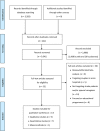Couples coping in the community after the stroke of a spouse: A scoping review
- PMID: 32089843
- PMCID: PMC7024616
- DOI: 10.1002/nop2.413
Couples coping in the community after the stroke of a spouse: A scoping review
Abstract
Aim: To summarize evidence on the poststroke coping experiences of stroke patients and spousal caregivers living at home in the community.
Design: A scoping review.
Methods: Extensive searches were conducted in credible databases. Articles published in the English language were retrieved. Data were extracted based on study location, aims, study design, sample size, time after stroke and key findings.
Results: Out of 53 identified articles, 17 studies were included in the review. Five key themes were as follows: (a) emotional challenges; (b) role conflicts; (c) lack of strategies in coping; (d) decreased life satisfaction of the couples; and (e) marriage relationship: at a point of change. Couples were not sufficiently prepared to cope and manage with stroke at home on discharge from the hospital. This review emphasized the need for hospitals to implement policies to address the inadequate preparation of couples in coping with stroke.
Keywords: community; coping; couples; experience; manage; nurses; nursing; stroke.
© 2019 The Authors. Nursing Open published by John Wiley & Sons Ltd.
Conflict of interest statement
The authors declare no conflicts of interest.
Figures
References
-
- Adriaansen, J. J. E. , Leeuwen, C. M. C. , Visser‐Meily, J. M. A. , Bos, G. A. M. , & Post, M. W. M. (2011). Course of social support and relationships between social support and life satisfaction in spouses of patients with stroke in the chronic phase. Patient Education and Counseling, 85(2), 48–52. 10.1016/j.pec.2010.12.011 - DOI - PubMed
-
- American Stroke Association (2019). For family caregivers. Available at: https://www.strokeassociation.org/en/help-and-support/for-family-caregivers accessed 21 May 2019.
-
- Arksey, H. , & O'Malley, L. (2005). Scoping studies: Towards a methodological framework. International Journal of Social Research Methodology, 8(1), 19–32. 10.1080/1364557032000119616. - DOI
Publication types
MeSH terms
LinkOut - more resources
Full Text Sources
Medical


